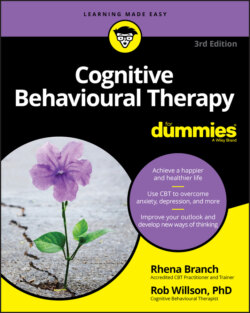Читать книгу Cognitive Behavioural Therapy For Dummies - Rob Willson - Страница 17
Emphasising the meanings you attach to events
ОглавлениеThe meaning you attach to any sort of event influences the emotional responses you have to that event. Positive events normally lead to positive feelings of happiness or excitement, whereas negative events typically lead to negative feelings like sadness or anxiety.
However, the meanings you attach to certain types of negative events may not be wholly accurate, realistic or helpful. Sometimes, your thinking may lead you to assign extreme meanings to events, leaving you feeling disturbed.
For instance, Tilda meets up with a nice man that she’s contacted via a dating app. She quite likes him on their first date and hopes he’ll contact her for a second meeting. Unfortunately, he doesn’t. After two weeks of eagerly checking her phone, Tilda gives up and becomes depressed. The fact that the chap failed to ask Tilda out again contributes to her feeling bad. But what really leads to her acute depressed feelings is the meaning she’s derived from his apparent rejection, namely, ‘This proves I’m old, unattractive, past it and unwanted. I’ll be a sad singleton for the rest of my life’.
As Tilda’s example shows, drawing extreme conclusions about yourself (and others and the world at large) based on singular experiences can turn a bad distressing situation into a deeply disturbing one.
Psychologists use the word disturbed to describe emotional responses that are unhelpful and cause significant discomfort to you. In CBT terminology, disturbed means that an emotional or behavioural response is hindering rather than helping you to adapt and cope with a negative event.
For example, if a potential girlfriend rejects you after the first date (event), you may think ‘This proves I’m unlikeable and undesirable’ (meaning) and feel depressed (emotion).
CBT involves identifying thoughts, beliefs and meanings that are activated when you’re feeling emotionally disturbed. If you assign less extreme, more helpful, more accurate meanings to negative events, you are likely to experience less extreme, less disturbing emotional and behavioural responses.
Thus, on being rejected after the first date (event), you could think ‘I guess that person didn’t like me that much; oh well – they’re not the one for me’ (meaning) and feel disappointment (emotion).
You can help yourself to figure out whether or not the meanings you’re giving to a specific negative event are causing you disturbance by answering the following questions:
Is the meaning I’m giving to this event unduly extreme? Am I taking a fairly simple event and deriving very harsh conclusions about myself (and/or others and/or the future) from it?
Am I drawing global conclusions from this singular event? Am I deciding that this one event defines me totally? Or that this specific situation indicates the course of my entire future?
Is the meaning I’m assigning to this event loaded against me? Does this meaning lead me to feel better or worse about myself? Is it spurring me on to further goal-directed action or leading me to give in and curl up?
